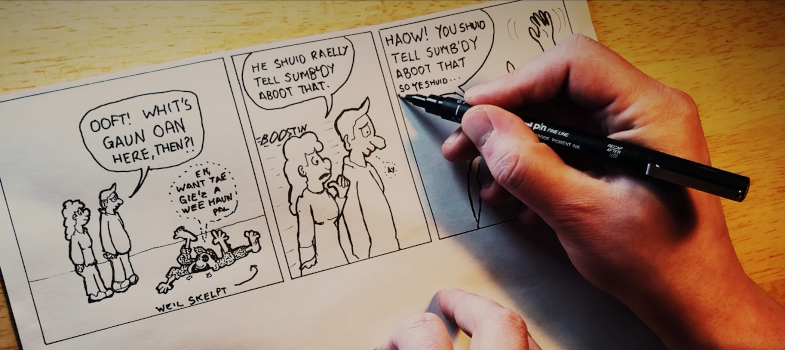S3 Humanities - Scots and Self-Expression
L.I: To understand how
language can be an important part of self-expression
SC: I can try to
express myself through writing in Scots
Curricular Links
•
When I engage with others, I can make a relevant
contribution, encourage others to contribute and acknowledge that they have the
right to hold a different opinion. I can respond in ways appropriate to my role
and use contributions to reflect on, clarify or adapt thinking. LIT 3-02a
•
As I listen or watch, I can make notes and
organise these to develop thinking, help retain and recall information, explore
issues and create new texts, using my own words as appropriate. LIT 3-05a
•
I can convey information, describe events,
explain processes or concepts, and combine ideas in different ways. LIT 3-28a
•
My learning in, through and about the expressive arts enables me to experience the inspiration and
power of the arts
Rationale
As we come to the end of the school year, the S3 cohort in particular
are reflecting on the past year and the progress they have made as an i-Sgoil
learner. This is especially important as they enter in senior phase, a time
which, for many learners, comes with added anxiety caused by assessment and certificated
courses. In order to best prepare learners for this next step, we are helping
them to engage in reflective activities that help them to see how much they
have achieved in the past year in the hope that this will build their
confidence for the transition to S4.
In the past, this class has responded well to tasks based around Scots
and some have commented that Scots in something
that is used in their homes and so familiar to them.
Using the youtube video of the poem ‘Whit Noo?’, written and performed
by Lisa Kennedy as a starter, a discussion around the importance of language as
part of identity will be held, linking to how speaking authentically can build confidence
and how everyone deserves for their voice to be heard.
The task set for this particular lessons asks them to write a reflective
paragraph and then translate all or just the key words into Scots using their
own knowledge of Scots and the English-Scots online translation dictionary provided.
Lesson Activities
- Learners to watch and listen to a youtube video of poem Lisa Kennedy
performing her poem ‘Whit
Noo?’
- Learners to engage in a discussion using the chat or class padlet
sharing their thoughts on both the message presented in the poem and how
the use of Scots helps to portray this message. Do they feel that the way
they speak is an important part of their identity?
- Assignment task; learners asked to complete a worksheet by first
writing a paragraph reflecting on how their year at i-Sgoil in S3 has
been, then translating this paragraph into Scots using their own knowledge
and the online dictionary.
- Extension: https://www.scotslanguage.com/learning?activity=6284
– learners to play around with the sentence builder to improve their Scots
vocabulary.
Assessment
Assessment tool chosen as a Teams Assignment to provide a way for
learners to respond to task and share work directly with teacher. This is due
to the confidence level of class in general, particularly certain members, who
find sharing work alongside their name in front of others significantly
triggering.
Use of anonymous padlet for class discussion responses provides a
similar option as above.
Differentiation by outcome will be used; learners can complete the task
by fully translating their work, or just translate the key words, depending on
their confidence level using Scots.
What went
well?
This group
of learners has responded well to Scots based tasks in the past and enjoy the
connection to their Scottish heritage and history. Interestingly, at the start
of this lesson, one learner made a connection between the historical restrictions
placed on Scots speakers and current political conflicts between larger and
smaller countries.
Attendance
during the lesson was not great with only 8 learners present, however, of this
8, 5 of them submitted the assignment task and all but one had given the
written Scots aspect of the task a really good go.
The translation
dictionary made a real difference in terms of confidence levels. In previous tasks
I hadn’t provided one and can see how that it is something that learners are
really glad of and willing to use to enhance their work.
The
reflections made by the learners were really insightful and for one learner in
particular, the Scots paragraph felt more naturally written with her
familiarity with the language coming through clearly.
I also
completed this task myself to give the learners an example answer to help them
get started. This was my first attempt at written Scots, which I explained to
the learners and I think encouraged some of the more reluctant Scots writers to
have a go!
What
would I do differently if I deliver this lesson again?
I
underestimated how easy some of the learners who are more comfortable with Scots
would find this task! They finished much more quickly than the rest of the
class and I didn’t originally have an extension task planned. This led to a bit
of a frantic google but I happened upon the Scots Language Centre website and
their ‘Sentence Builder’ interactive game. Although this is clearly pitched at
young learners, it worked well as an extension for those keen to increase their
vocab. The fact that it reads the words out loud was also really helpful.
What are
my next steps?
As there
were a lot of learners missing during this lesson, I plan to ask that this task
is completed during the weekly catch-up session as I feel that it is something
that a lot of learners would enjoy completing and will also present staff with
an insight into any individual concerns about transition.
Examples
of learners work (and my attempt!) attached as images.
